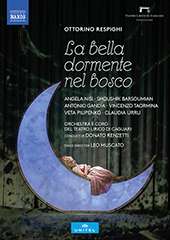|
Back
04/09/2020
Ottorino Respighi: La bella dormente nel bosco
Angela Nisi (the princess), Antonio Gandia (Prince April), Shoushik Barsoumian (The Blue Fairy), Vincenzo Taormina (the king, the ambassador), Veta Filipenko (the queen, the old lady, the frog), Lara Rotili (the cat, the duchess, the cuckoo), Claudia Urru (the spindle, the nightingale), Enrico Zara (Mister Dollar, the jester), Nicola Ebau (a lumberjack, doctor), Francesco Leone, Marco Puggioni, Enrico Zara (doctors), Orchestra e Coro del Teatro Lirico di Cagliari, Gaetano Mastroiaco (chorus master), Donato Renzetti (conductor), Leo Muscato (stage director), Giada Abiendi (set designer), Vera Pierantoni Giua (costume designer), Alessandro Verazzi (lighting designer), Luigia Frattaroli (choreographer), Fabio Massimo Iaquone, Luca Attilii (video designers), Tiziano Mancini (video director)
Recording: Teatro Lirico di Cagliari, Italy (February 7-10, 2017) – 88’
Naxos 2.110655 (or Blu-ray NBD0106V) – PCM Stereo and DTS 5.1 – NTSC 16:9 – Region 0 – Booklet in English – Subtitles in Italian, English, German, Japanese and Korean

   
Best known by his two symphonic poems, The Pines of Rome (1924) and The Fountains of Rome (1916), Ottorino Respighi’s exiguous operatic livret, to this day, retains degreed obscurity. His writings have, topically, operated on multiple levels, whether it be the riveting, historical backdrop of the French Revolution in Marie Victoire (1914) or even the Symbolist ambivalences discovered inside the 1927 La campana sommersa. On another thematic front, several composers have turned to Charles Perrault’s fabled writing to execute grand gestures, be it romantically dramatic (i.e. Tchaikovsky’s Sleeping Beauty) or surging like a plunging hemline into stranger chasms of bizarre fantaisie such as this fiaba musicale in three acts.
Ottorino Respighi wrote La bella dormente nel bosco at the behest of puppeteer Vittorio Podrecca in 1922, and for 20 years this version was performed throughout the world...undoubtedly, one can imagine a score filled with outrageous, whimsically absurd Lewis Carroll-like inventions to satisfy the bambini. But this rendition transmogrified into a more sophisticated staging that heavily emphasized dancing, and in particular the use of many children. Such a swing turns attention to Luigia Frattaroli’s choreographic banalities. While his footwork destabilizes, it’s given a further itch by Giada Abiendi’s vapid two-dimensional set. Small pockets of small “brilliances”, however, radiate through the Iaquone/Attilii team in video renderings (specifically the spider web) which give La bella quasi-depth though the recipe is “templated” and “mechanical”. Costuming by Vera Piersantoni Guia tries for an opulent outcome, but the fabric clings uneventfully like cardboard cutouts...are we back in a grade school play?
While Respighi’s vast cast adds texture, few singers turn heads. Vincenzo Taormina’s King is most resolute and consistent throughout. The same can be said about the Queen, here sung by Veta Pilipenko. Within the atrociously dressed Blue Fairy, a key character in moving the opera along, we find Shoushik Barsoumian whose unabsorbing depiction thinly connects to spritely conveyances with a broadly unrefined register and unremarkable inflections...no finesse exudes, leaving the stage dry. Undoubtedly, focus is placed upon The Princess, and in that capacity, Angela Nisi does a substantial job, yet the royal protagonist possesses an ironic boldness that doesn’t lift Perrault’s charm off the page. In search of the aforementioned, Prince April, however, has one of the strongest deliveries and helps hold the production together.
Charles Perrault's storyline is widely stretched, so much so, that the craziness is excessively drivel. Such inaneness argues for stronger immaculateness. The absence of any definable crispness in direction makes this Cagliari-staged performance lose its spellbinding charisma. Blocking and cast members’ movements are “in another galaxy” with no one seemingly and fittingly planted within their roles. Look at Tiziano Mancini’s camera edits, and one can see that the staging is flat-lined and unabsorbing. Without unlocking that key element, La bella dormente nel bosco fritters away all of Respighi’s much deserved magic.
In an attempt to find strength in Respighi (and, musically-speaking, it certainly has!), a second visit should be strongly considered via an “audio only” option since Donato Renzetti’s conducting is fabulously fit and energetic, and the music is stimulating! In this way one will sense an unfolding of Respighi’s vivid imagery: overall, the potpourri of unique instrumentation remarks upon Debussy’s dreaminess, Pierné Cydalise punctuations, Gottschalk’s Cajun-piano sass and flickers of Richard Strauss, yet the Italian’s avenue is widely his own.
We can’t give up on La bella dormente nel bosco for it has a deserved place in the repertoire. Positioned on a distant sideline for now, this œuvre can be sent back out onto the field with a re-think of this musical repartee.
Christie Grimstad
|